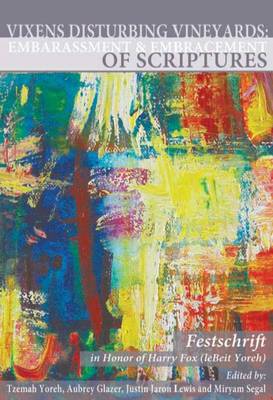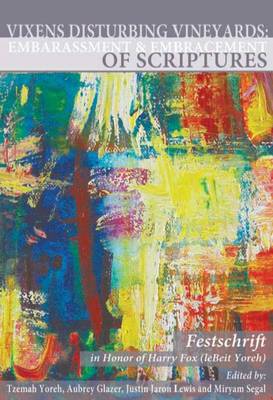
- Afhalen na 1 uur in een winkel met voorraad
- Gratis thuislevering in België vanaf € 30
- Ruim aanbod met 7 miljoen producten
- Afhalen na 1 uur in een winkel met voorraad
- Gratis thuislevering in België vanaf € 30
- Ruim aanbod met 7 miljoen producten
Zoeken
Vixens Disturbing Vineyards
Embarrassment and Embracement of Scriptures--A Festschrift Honoring Harry Fox (Lebeit Yoreh)
€ 272,45
+ 544 punten
Omschrijving
Embarrassment and embracement are two moments in the reading, misreading and re-reading of scriptures, defined broadly to include both canonical and non-canonical texts. Despite what Harold Bloom calls our "belatedness" in this process, every reading community has its way of confronting that moment of embarrassment so as to re-embrace or reject its implications. These implications are especially strong in religious cultures with a nomian tradition. By entering into that very tension between what Fox calls embarrassment and re-embracement, every reader recognizes the anxiety of a narrative's influence upon a community. Papers dealing with different aspects of this phenomenon are part of a festschrift honoring Professor Harry Fox (LeBeit Yoreh) the originator of this seminal idea in the transmission of texts. Contributors include such scholars as Yaakov Elman, Simcha Fishbane, the late Chana Safrai and Tirzah Meacham as well as many students, colleagues and friends of Professor Fox.
Specificaties
Betrokkenen
- Uitgeverij:
Inhoud
- Aantal bladzijden:
- 690
- Taal:
- Engels
- Reeks:
Eigenschappen
- Productcode (EAN):
- 9781934843413
- Verschijningsdatum:
- 1/04/2010
- Uitvoering:
- Hardcover
- Formaat:
- Genaaid
- Afmetingen:
- 156 mm x 234 mm
- Gewicht:
- 1124 g

Alleen bij Standaard Boekhandel
+ 544 punten op je klantenkaart van Standaard Boekhandel
Beoordelingen
We publiceren alleen reviews die voldoen aan de voorwaarden voor reviews. Bekijk onze voorwaarden voor reviews.










